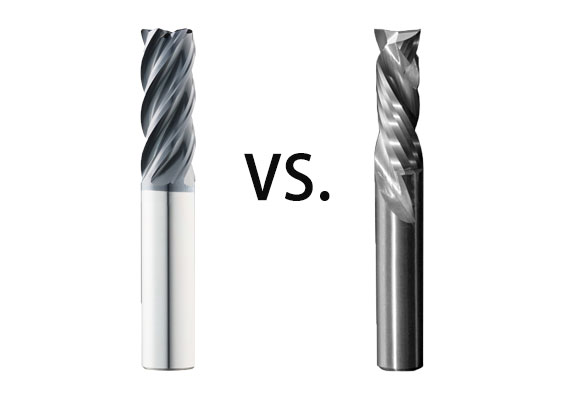
End Mill vs. Router Bit: What Are The Differences?
End mills and router bits are tools that are frequently used in CNC machines. Both of them have spiral flutes and look similar to each other. However, what are the differences? Scroll down to discover the answer.
End mills vs. Router bits
- Application: Router bits are primarily used for cutting and shaping softer materials, such as wood, plastics, etc, while end mills are designed for cutting, plunging, and milling harder materials, such as metal.
- Geometry: Router bits have various shapes like a spiral, straight, roundover, chamfered, etc, while end mills typically have a flat or ball-shaped cutting tip.
- Shank size: Usually, end mills are equipped with a larger shank diameter than router bits, allowing for heavy-duty tasks and providing stronger clamping force.
- Cutting speed: End mills usually operate at a higher speed, resulting in higher efficiency, while router bits rotate at a relatively lower speed to avoid burning the workpiece.
What is an end mill?
End mills are commonly used in manufacturing and metalworking industries to create complex shapes and features in a workpiece, such as pockets, slots, and grooves. An end mill consists of two parts: the shank and the flute. The shank is held by the collet and the flute does the cutting job. The number of flutes varies according to applications, including three, four, five, seven, nine, and more. Two-fluted and four-fluted end mills are the most widely used.
End mills are made from different materials for different applications, including high-speed steel, solid carbide, and diamond, just to name a few. Sometimes, coatings and treatments are used to improve their performance and durability. Coating materials include TiN, TiCN, ZrN, and more.
There are several types of end mills, including upcut, downcut, compression, ball-end, V-cut, roughing, fishtail, etc.
What is a router bit?
Router bits are commonly used in woodworking projects for cutting, making joints, engraving, and profiling. Similar to end mills, router bits comprise the shank and the flute. There are numerous types of router bits, including straight bits, spiral bits, roundover bits, chamfer bits, tongue & groove bits, Roman Ogee bits, and more.
Konetool, a reputable router bit supplier
Konetool has rich experience in supplying industrial-quality router bits for furniture factories, woodworking tool distributors, and other companies across the world. If you’re looking for a reliable router bit supplier for your business, please feel free to contact us.